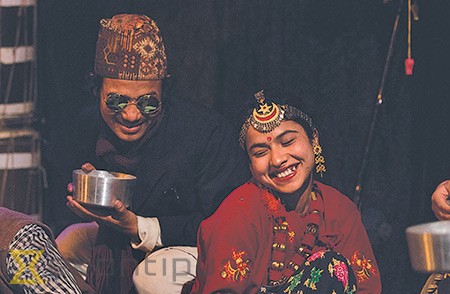The road to redemption
 Timothy Aryal / Dec 30: Often times we ask ourselves: If we were given a chance to re-do what we’ve done over the course of our lives, how many changes would we make in retrospect? We might not be able to actually change the past, however debilitating or dispiriting it might be, and living with regrets comes parts and parcel with the human experience. The truth is that pleasant, and painful, memories make so much of who we are and life oftentimes resembles a freewheeling tragicomedy—where we, the actors, are masquerading through the theatre of life. In the linear plain of life at action, there are no ‘Ifs’ but only ‘Becauses’.
Timothy Aryal / Dec 30: Often times we ask ourselves: If we were given a chance to re-do what we’ve done over the course of our lives, how many changes would we make in retrospect? We might not be able to actually change the past, however debilitating or dispiriting it might be, and living with regrets comes parts and parcel with the human experience. The truth is that pleasant, and painful, memories make so much of who we are and life oftentimes resembles a freewheeling tragicomedy—where we, the actors, are masquerading through the theatre of life. In the linear plain of life at action, there are no ‘Ifs’ but only ‘Becauses’.
At the heart of the play Chiso Bhanjyang, a Nepali adaptation of British novelist Ian McEwan’s best-selling novel Atonement, is the story of a girl who commits an irredeemable offence when she is just an adolescent. The plot then follows the girl right through her twilight years as she attempts to redeem an act she committed as a teenager. We trace the story through three avatars of Garima (all played by Pooja Lama)—first as an adolescent, then as an adult and finally as an elderly—who is constantly plagued by the acute need to redeem her act.
The premise of the play is simple enough, but tugs at the complex relationships that we live with. At its heart, Chiso Bhanjyang is a story of love and jealously and its fall outs. It opens out with two characters, Alok (Anup Neupane) and Muna (Sabina Gopali) exchanging flirtatious exchanges as their love for each other begins to bud. But their nascent romance is cut short when Alok is jailed on accusations of raping one of Muna’s sisters, even though the whole affair is based on a lie cooked up by the youngest sister Garima. The rest of the play then traces how each of the characters deal with the consequences of Garima’s spur-of-the-moment lie that changes all of their lives forever.
Cutting back and forth between the village in Eastern Nepal and the Maoist Insurgency (which Alok joins after being escaped from prison), Chiso Bhanjyang is one of the rare instances where a foreign material has been seamless adapted to the localised Nepali context. Fueled by an excellent script, the play is further boosted by powerful performances put in by a cast of mostly up and coming theatre artists. Anup Neupane, for instance, portrays Alok with restrained grace that instantly has the audience sympathising with his difficult situation, whereas Sabina Gopali’s role as the eldest child of a well-to-do family was performed with deft realism. All the while, Pooja Lama, who plays the three different avatars of Garima, easily steals the show with her seamless transitions between characters that span well over 50 years.
For a play that has such a famed source material—the 2007 adaptation of the book was nominated for six Oscar nods—it was refreshing to see the director Sandeep Shrestha convert the plot into a play that could have very well been penned by a Nepali author. Furthermore, the powerful one-liners and monologues, powerfully delivered, made it easy to forget that you were actually watching an adaptation and not an original work. This speaks to the genuine effort the cast and crew put into the production of Chiso Bhanjyang and it must be lauded for setting a new benchmark for localising seemingly foreign themes and contexts.
That being said, the play did have its share of shortcomings. The soundtrack, for instance, was often off-key from the action transpiring on stage, sometimes to the extent of tone-deafness. The quick pace of action, particularly when Alok is accused of rape and the fallout that follow, was hurried to a point where it could have been mistaken for being contrived. The minimalistic set, if one were to nitpick, also stole from the additional realism that would not have gone amiss.
But all in all, Chiso Bhanyang, the last play for 2017 in Kathmandu’s theatre circuit, was an apt full-circle for what has been a phenomenally productive year. With a list of plays that includes the poignant Milk Tea, the powerful adaptation Antigone, and the hilarious but jarring Line, it is safe to say that 2017 brought ample laughs, some tears and plenty of thought provoking moments to Kathmandu’s theatres. And if Chiso Bhangyang, which will run into the New Year at Mandala Theatre, is anything to go by, we are in for another banner year in 2018 as well. The Kathmandu Post
